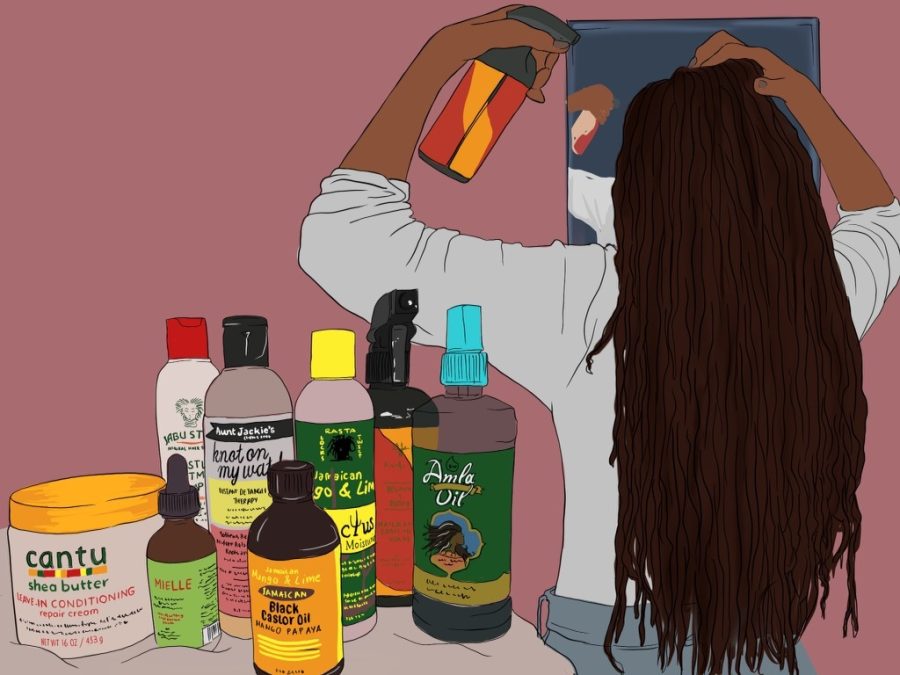The US hair care industry lags behind in accepting Black hair
Hair is an essential part of Black identity and culture in America. It’s time for hair care brands to reflect that.
For Black women, hair creates a sense of identity and self. Manufacturers should do more to accommodate Black hair types with their products. (Staff Illustration by Aaliya Luthra)
March 11, 2022
Hair matters. It is a part of our identity, our sense of self. Hair is an extension of culture, a unified experience. But my hair did not start mattering to me on a personal level until I had to love it and nourish it on my own.
Growing up in South Africa, my mother did my hair. It was a tedious exercise with broken combs and tears. Even now, when she oils my scalp, it’s a moment that bonds us. In South Africa, hairdressers take over when our moms grow tired of fighting with our coils. Eventually, hairdressers become a part of our families — that is how strong the bond is.
I didn’t realize what a luxury it was for me to be able to go to one of the multiple nearby salons every two weeks to have my locs freshly washed, twisted and braided. What cost me a reasonable $20 in South Africa now costs me $140 in America.
Why is something that can be cut and grown back so central to our identity? Faced with limited hair products and even fewer natural hair salons after moving to the United States, my hair became something that set me apart. Even in a majority-Black country like South Africa, the range of hair products designed for my hair type could have been broader. But in the United States, seeing shelves after shelves of products for white hair but just a couple of products that worked for my hair frustrated me. In America, my hair became a part of my Blackness and my identity.
When I started living in the United States, I was shocked by how much the geography and climate impacted my hair. I had very moisturized and healthy hair as a South African throughout high school. I couldn’t touch my hair without my hand coming back shiny with hair oil. I had thick, tough hair that broke endless combs in my household for years. Unfortunately, moving to the United States put my hair in dire need of rescue. For the first time in my life, my hair was dry, dying, and my tight 4C coils changed into something looser. I searched desperately for anything that would moisturize my ever-changing hair, stop the breakage and bring the natural sheen back to my locs. Still, the lack of diversity in hair products in America astounded me. Without helpful products available at the drugstore, YouTube taught me to mix everything from avocados, coconut oil and mayonnaise to make something good enough to save my hair.
In general, more products from oils to conditioners are made for white hair. This disparity became frustratingly noticeable with my move to the United States. Target has one of the more comprehensive selections, but is still only limited to the basic shea butter and coconut oils.
Meanwhile, makeup brands have jumped onto the inclusivity bandwagon while hair brands are lagging behind. Companies like Fenty Beauty and Juvia’s Place opened the door by extending their ranges of makeup shades. Now, inclusivity is a standard we expect from all makeup brands. When one end of the color spectrum does not extend far enough, brands are shamed and called out for it.
Why are we still allowing hair brands to only cater to one hair type? White-owned corporations own many of the Black hair brands in the shopping aisles today. Brands created by Black people — such as Cantu, Carol’s Daughter and Dark and Lovely — have quickly been acquired by white corporations. This could be why, no matter how many nourishing shampoos and hair masks I use, my hair never seems to get enough moisture. My hair being oily is something I cherish, a direct contrast to my white friends who consider oily hair a sign of grease and time for a wash day. Why can’t white corporations ditch their assumptions and listen to people of color about their own hair? Whether afros, locs or braids, hair has always been a statement for Africans. In early African societies, hair demonstrated wealth, marital status and overall health. It is time for the shops we buy from to reflect this.
In the United States, people are reclaiming their natural hair. Take Jay-Z’s hair. For years, he wore his hair to conform to the white world’s standards. However, now that he has carved out his wealth, he can truly shine in his identity and wear his natural hair. He is a Black billionaire with locs — a rarity but essential for representation in the community. In South Africa, hair did not matter so much — there, it was normalized, celebrated and caring for it was more accessible. Having Black hair did not stand out for me until I heard stories of Black people getting fired or reprimanded for wearing their hair in braids, locs or in an afro.
Hair is an essential statement to us because it shows our pride, struggle and culture. Most days, I want to give up, shave all my hair off and let that be my statement to the world. But after growing my locs for almost 15 years, I realize that my hair is my history. It’s 15 years of sitting in salons, sitting between my mother’s legs, having her oil my scalp; it’s discovering the meaning of identity when I moved to the United States. I may have not realized it in South Africa, but hair has always mattered to me. Not the individual follicles, but what Black hair represents.
Contact Mika Chipana at [email protected].























































































































































